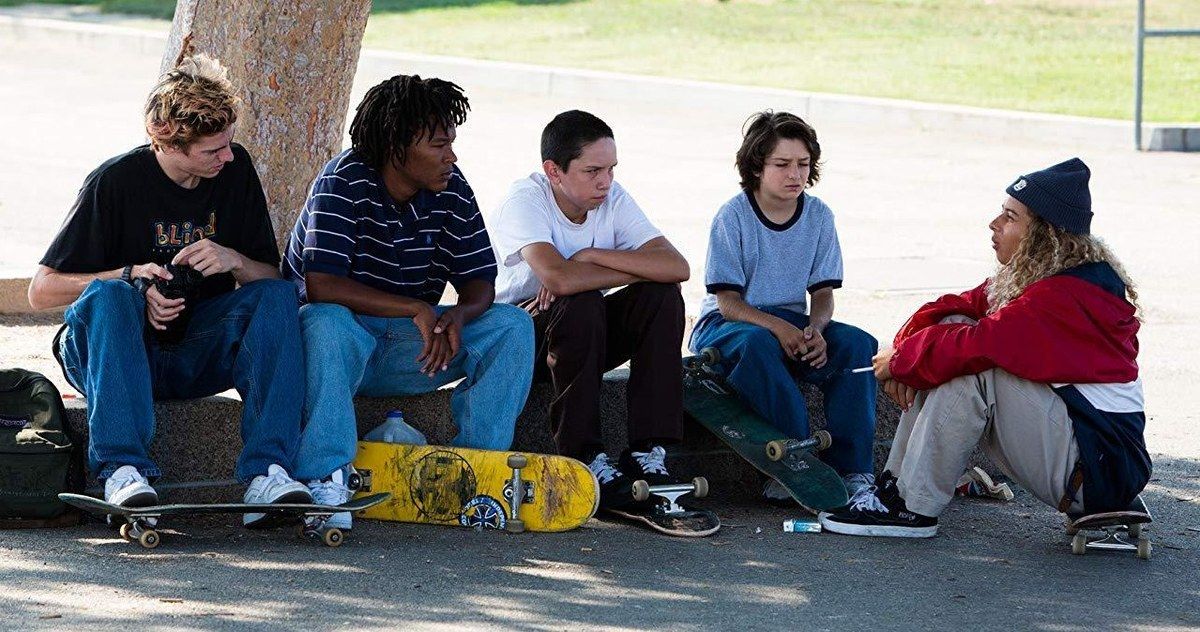Jonah Hill makes his feature film directorial debut with the coming of age drama, Mid90s. It is a period tale of a lonely thirteen-year-old boy who finds acceptance in a group of skateboarders. The film waxes nostalgic for the era, but is disappointingly one-note in its development of the characters. We get the themes of drug use, sexual exploration, and belonging. The delivery is just rote; amateurish in style and substance. The child actors are engaging to a degree, but Mid90s is not an impactful story.
Sunny Suljic stars as Stevie, a quiet Los Angeles kid trying to find himself. He's pummelled daily by his abusive and demeaning older brother, Ian (Lucas Hedges). Their single mother (Katherine Waterston) is largely absent, focusing her attention on a fleeting boyfriend. Stevie observes a group of skateboarders who hang around the local skate shop. He yearns to be a part of them, but can't skate and has a childish board.
Stevie gets over his fears and enters the shop. He's envious as the group watches skateboarding videos, smokes cigarettes, and engages in juvenile banter. Stevie's noticed by the slighter older Ruben (Gio Galicia). He invites Stevie to hang out and introduces everyone. Their leader and by far the best skateboarder is Ray (Na-Kel Smith), a teen with dreadlocks who dreams of skating professionally. His best friend is the amiable, well-off stoner, F*cksh*t (Olan Prenatt); who prefaces every sentence with the choice vulgarities. The last member of the crew is the shy, not so intelligent, Fourth Grade (Ryder McLaughlin); who is constantly filming with a video camera. Stevie becomes a part of the gang, much to the consternation of his mother and brother. Their teenage rebelliousness is initially exciting, but yields consequences.
Stevie's journey is predictable. Impressionable kid starts to rebel because he wants to be cool. Drinking, doing drugs, hooking up with girls, the road is an all too familiar one. Stevie doesn't say much. Jonah Hill, who also wrote the screenplay, has him as quiet and observational. He's the window for the nineties Los Angeles music, fashion, and street scene. We're along for the ride as Stevie engages in adult activities and takes some severe lumps along the way. The issue is that every character, including Stevie, is niche. They all feel like cardboard cutouts. Hill paints a one dimensional picture. Stevie needed to show more depth.
I recently saw Bo Burnham's absolutely brilliant Eighth Grade. Both films address the challenges of youth and finding acceptance. Eighth Grade is much more insightful and better made. That film isn't remotely as graphic or edgy as Mid90s. It's far more innocent, yet tackles many of the same themes with a stronger inflection. Ray is the sole character in Mid90s with any degree of sophistication. He is curious about the world, not just a part of it. Jonah Hill needed more character work in his script. At a mere eighty-four minutes, Mid90s had ample room for growth.
Mid90s has a great soundtrack and original score by the Oscar winning team of Trent Reznor and Atticus Ross. Their collaborations (The Social Network, The Girl with the Dragon Tattoo) continue to be fantastic. The soundtrack is largely nineties hip-hop, accompanied by wistful keyboard and sound effects driven pieces. The music does an excellent job setting a melancholic tone for the film.
Jonah Hill's initial foray in the director's chair comes up short. Mid90s isn't well rounded enough to effectively tell a meaningful story. Everyone who grew up in this period will feel a pang of nostalgia. The simpler world before cell phones and social media catapulted youth into the morass of the digital age. Mid90s is distributed by A24 films.

